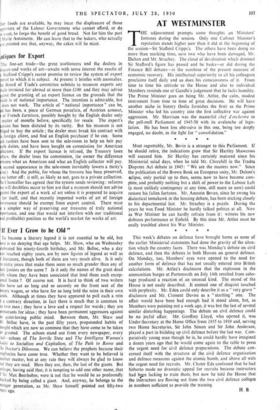If Ever I Grow to be Old "
To become a literary legend it is not essential to be old, but ere is no denying that age helps. Mr. Shaw, who on Wednesday lebrated his ninety-fourth birthday, and Mr. Belloc, who a day ter reached eighty years, are by now figures of legend as well as literature, though both of them are very much alive. Is it only e extra years that make them seem so much grander than any of eir juniors on the scene ? it only the names of the great dead ith whom they have been associated that lend them such excep- nal lustre ? Of course not. It is hard to think of two writers ho have sat so long and so securely on the front seat of the erary wagon, or who have for so long held the reins in their own rids. Although at times they have appeared to pull each a rein a contrary direction, in fact there is much that is common to e two men ; they have a love and a respect for words ; they are rmorants for ideas ; they have been permanent aggressors against e quiet-loving public mind. Between them, Mr. Shaw and r. Belloc have, in the past fifty years, propounded habits of ought which are now so common that they have come to be taken ✓ granted. The echoes stand out from every newspaper, every fact—echoes of The Servile State and The Intelligent Woman's ;hide to Socialism and Capitalism, of The Path to Rome and he Doctor's Dilemma. We can believe the prophets because their rophecies have come true. Whether they want to be believed is pother matter, but at any rate they will always be glad to know at they are read. Here they are, then, the last of the giants. But erhaps, having said that, it is tempting to add one other name, that f Sir Max Beerbohm, were it not that he would be so profoundly hocked by being called a giant. And, anyway, he belongs to the ounger generation, as Mr. Shaw himself pointed out fifty-two rears ago.


































 Previous page
Previous page